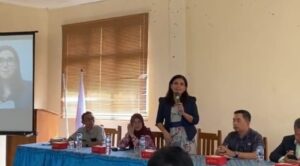
BINUS University’s Magistrate program of the Communication Department is taking big steps in community empowerment and sustainable development with its “Digital Literacy 5.0++” program. This initiative, aligned with the Sustainable Development Goals (SDGs), particularly SDG 3 (Good Health and Well-being) and SDG 5 (Gender Equality), focuses on “Kampung KB” (Family Development Villages) in Bogor Regency.
Under the leadership of Dr. Virienia Puspita as the initiative project leader, the “Digital Literacy 5.0++” program recognizes the crucial link between digital literacy and addressing critical social issues. It focuses on empowering communities with the knowledge and skills to navigate the digital world effectively and responsibly. This includes providing information and resources related to sexual and reproductive health, enabling individuals to make informed choices and access-appropriate healthcare services.
Empowering Individuals Through Reproductive Choice
Reproductive choice is a fundamental human right. By providing access to information and resources on family planning, safe motherhood, and sexual health, the program aims to empower individuals to make informed decisions about their bodies and their futures, breaking down barriers to reproductive choice and enable individuals to build the futures they desire.

Implemented between April and June 2024, the “Digital Literacy 5.0++” program employed a multifaceted approach to achieve its goals. This included “Train the Trainers” workshops designed to equip BINUS University lecturers with the skills to effectively deliver digital literacy training to the community. On-site workshops held in Ciawi focused on providing in-depth knowledge and skills related to sexual and reproductive health. Online workshops conducted in Jonggol broadened the program’s reach, addressing digital literacy, fake news, and misinformation.
The program has achieved significant outcomes, including improved health literacy among participants, who demonstrated increased knowledge and understanding of sexual and reproductive health. Participants also gained valuable digital literacy skills, enabling them to identify fake news, protect their online privacy, and leverage technology for a better quality of life. Lastly, the project team developed valuable educational resources, such as training modules and videos, to ensure the program’s sustainability and potential for wider dissemination.
Reference:
(By Nathan Rotinsulu, President’s Office)
... ... ...